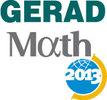HEC Montréal, Canada, 6 - 8 mai 2013
Journées de l'optimisation 2013
HEC Montréal, Canada, 6 — 8 mai 2013

MA5 Optimisation sans derivées I / Derivative-Free Optimization I
6 mai 2013 10h30 – 12h10
Salle: CPA du Québec
Présidée par Sébastien Le Digabel
4 présentations
-
 10h30 - 10h55
10h30 - 10h55Sequential Design for Constraint Satisfaction in Optimization Problems
The expected improvement (EI) and variants are a popular sequential design heuristics for solving blackbox optimization problems. Although not generally regarded as superior for conventional optimizations - unless function evaluations are very expensive, or have many minima - it does have nice global convergence properties not enjoyed by most alternatives and remains one of a few viable options when the objective function evaluations can only be observed with noise. In this talk we discuss the far greater potential for statistical approaches to constrained blackbox optimization, a far more common and much harder engineering problem. We observe that modern nonparametric classification models represent a largely untapped resource in the mapping of constraint satisfaction regions. However appropriate sequential design heuristics remain illusive especially when the solution is likely to lie on the boundary of the valid region. As an illustration we consider a hydrology problem where, even with a simple linear objective function, learning a nontrivial valid region complicates the search for a global minimum.
-
 10h55 - 11h20
10h55 - 11h20Optimization in Decomposition-based System Design
Engineering system design problems are often decomposed to manage complexity and size. The resulting sub-problems are distributed to different design teams according to expertise for effective use of analysis tools and optimization algorithms. Interactions among these separate design activities must be taken into consideration to ensure system integration and optimality. In this talk we present optimization-based approaches to coordinate the solution of such decomposed and distributed design problems. We begin with hierarchical decompositions and proceed to non-hierarchical formulations that enable the solution of general multidisciplinary design optimization problems. Vehicle and aircraft design examples are used to illustrate the presented methodologies.
-
 11h20 - 11h45
11h20 - 11h45Multi-Objective Takeoff Optimization with NOMAD
During takeoff, consumption, noise and pollution can be minimized through a multi-objective optimization of the vertical profile of the trajectory which is defined by a reduced set of speeds and altitudes that must be reached. The problem is solved using MADS algorithm, implemented in the NOMAD library.
-
 11h45 - 12h10
11h45 - 12h10Simultaneous and Sequential Approaches to Optimizing Well Placement and Control
We investigate approaches to maximizing oilfield production by hybridizing global (PSO) and local (pattern search) optimization techniques. The decision variables are the locations and bottom hole pressures of injection and production wells, and the objective function is computed using a reservoir simulator. We present the results of several numerical experiments.

